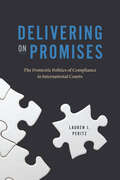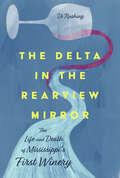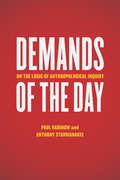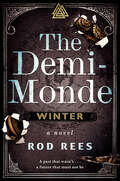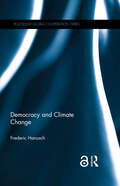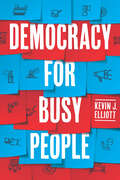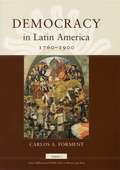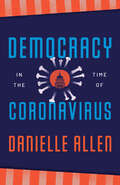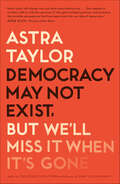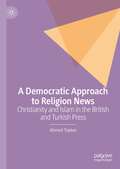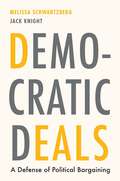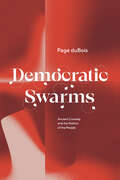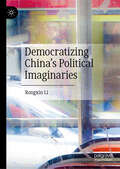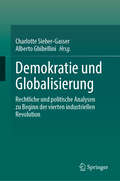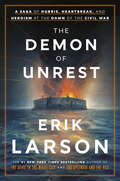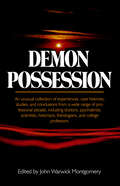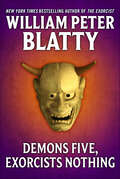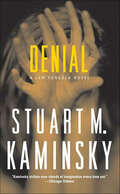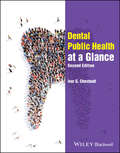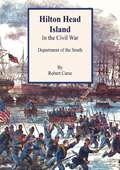- Table View
- List View
Delivering on Promises: The Domestic Politics of Compliance in International Courts (Chicago Series on International and Domestic Institutions)
by Lauren J. PeritzA timely investigation into the conditions that make international agreements—and the institutions that enforce them—vulnerable. When do international institutions effectively promote economic cooperation among countries and help them resolve conflict? Although the international system lacks any central governing authority, states have created rules, particularly around international economic relations, and empowered international tribunals to enforce those rules. Just how successful are these institutions? In Delivering on Promises Lauren J. Peritz demonstrates that these international courts do indeed deliver results—but they are only effective under certain conditions. As Peritz shows, states are less likely to comply with international rules and international court decisions when domestic industries have the political ability to obstruct compliance in particular cases. The author evaluates the argument with an extensive empirical analysis that traces the domestic politics of compliance with the decisions of two international economic courts: the World Trade Organization’s dispute settlement mechanism and the Court of Justice of the European Union. At a time when international agreements are under attack, this book sheds light on the complex relationship between domestic politics and international economic cooperation, offering detailed evidence that international economic courts are effective at promoting interstate cooperation.
Della's House of Style: Stories
by Felicia Mason Rochelle Alers Donna Hill Francis RaySpecializing in Cuts, Weaves, Manicures, Pedicures. . . and Passion. Rochelle Alers' Sweet SurrenderManicurist Maria Parker can't help but notice when a hunky financial planner brings his niece into Della's for a manicure. And when he starts to frequent the salon himself for manicures from Maria, she's pretty sure he has more than cuticles on his mind...Donna Hill's It Could Happen to YouWhen Della turned Rosie's Curl and Weave into Della's House of Style, a few things managed to slip through the cracks—and now she's under fire by the IRS. When a by-the-book IRS agent comes to investigate, Della is infuriated by his presence in the salon—and reluctant to admit that she's growing more than a little used to it...Felicia Mason's Truly, HonestlyHigh-maintenance investment banker Sheila needs some serious pampering. On a whim, she decides to get a shoulder-length weave at Della's House of Style, and afterwards visits the salon's lounge, where a sexy D.J. has a song in mind for her...Francis Ray's A Matter of TrustSingle mother Hope Lassiter, once a critically acclaimed actress, is now a cosmetologist at Della's House of Style. When a handsome director tries to woo her back to the stage, Hope has to wonder if his intentions are more than professional...
The Delta in the Rearview Mirror: The Life and Death of Mississippi's First Winery
by Di RushingAfter graduating from Mississippi State University in 1976, Di Rushing and her husband, Sam, found themselves back on their family farm near Merigold, Mississippi, with 350 acres and no real clue what to do. The couple decided to open the first winery in Mississippi, and with it, a successful business was born. Six years later, a small restaurant joined the Delta winery. Both businesses were thriving by 1990, with eight national award-winning wines, a beautiful vineyard, and a successful restaurant.But in March of 1990, a series of unforeseen events rocked the operation. After the Rushings discovered one of the tour guides, Ray Russell, selling drugs in the winery parking lot, they fired him. He responded with a terrorizing vengeance that persisted over the next nine months. In the early morning hours, the former guide broke into the winery, crept into the wine cellar, and released the entire inventory—nearly a quarter of a million dollars’ worth—down the drain. Fortunately, his incompetence thwarted his most destructive intention to blow up the restaurant. In his rampage, he broke all the windows, which allowed the gas from the kitchen oven to escape, sparing the premises. Though the Rushings rebuilt with the help of their community, Russell continued to stalk and threaten the young family. As his menacing behavior continued to escalate, the Rushings closed their business of fourteen years and moved to Ouray, Colorado, where they began rebuilding their lives. Culminating in the sudden, violent murders of Russell, his wife, and his father twenty-five years later, this book tells a story of both shock and resilience, charting Mississippi history in the process.Intertwined with the true crime narrative, The Delta in the Rearview Mirror: The Life and Death of Mississippi’s First Winery details author Di Rushing’s life in and out of Mississippi, including growing up in 1960s Greenville, attending university, traveling overseas, and the relationships she cultivated along the way.
Demands of the Day: On the Logic of Anthropological Inquiry
by Paul Rabinow Anthony StavrianakisDemands of the Day asks about the logical standards and forms that should guide ethical and experimental anthropology in the twenty-first century. Anthropologists Paul Rabinow and Anthony Stavrianakis do so by taking up Max Weber’s notion of the “demands of the day.” Just as the demand of the day for anthropology decades ago consisted of thinking about fieldwork, today, they argue, the demand is to examine what happens after, how the experiences of fieldwork are gathered, curated, narrated, and ultimately made available for an anthropological practice that moves beyond mere ethnographic description. Rabinow and Stavrianakis draw on experiences from an innovative set of anthropological experiments that investigated how and whether the human and biological sciences could be brought into a mutually enriching relationship. Conceptualizing the anthropological and philosophic ramifications of these inquiries, they offer a bold challenge to contemporary anthropology to undertake a more rigorous examination of its own practices, blind spots, and capacities, in order to meet the demands of our day.
The Demi-Monde: Winter (The Demi-Monde Saga)
by Rod Rees“You can’t help getting caught up in the smartly-paced story…which is served up with lashings of steampunk relish.”—SFX (UK)“Rees makes the book work: the world he’s created is a psychopathic nightmare.”—The GuardianIn the Demi-Monde, author Rod Rees has conjured up a terrifying virtual reality, a world dominated by history’s most ruthless and bloodthirsty psychopaths—from Holocaust architect Reinhard Heydrich to Torquemada, the Spanish Inquisition’s pitiless torturer, to Josef Stalin’s bloodthirsty right-hand man/monster, the infamous Beria. The Demi-Monde: Winter kicks off a brilliant, high concept series that blends science fiction and thriller, steampunk and dystopian vision. If Neil Gaiman, Neal Stephenson, James Rollins, and Clive Cussler participated in Suzanne Collins’s The Hunger Games, the result might be something akin to the dark and ingenious madness of Rees’s The Demi-Monde: Winter.
Democracy and Climate Change (ISSN)
by Frederic HanuschDemocracy and Climate Change explores the various ways in which democratic principles can lead governments to respond differently to climate change. The election cycle can lead to short-termism, which often appears to be at odds with the long-term nature of climate change, with its latency between cause and effect. However, it is clear that some democracies deal with climate change better than others, and this book demonstrates that overall stronger democratic qualities tend to correlate with improved climate performance.Beginning by outlining a general concept of democratic efficacy, the book provides an empirical analysis of the influence of the quality of democracy on climate change performance across dozens of countries. The specific case study of Canada’s Kyoto Protocol process is then used to explain the mechanisms of democratic influence in depth. The wide-ranging research presented in the book opens up several new and exciting avenues of enquiry and will be of considerable interest to researchers with an interest in comparative politics, democracy studies and environmental policies.
Democracy Erodes from the Top: Leaders, Citizens, and the Challenge of Populism in Europe (Princeton Studies in Political Behavior #40)
by Larry M. BartelsWhy leaders, not citizens, are the driving force in Europe&’s crisis of democracyAn apparent explosion of support for right-wing populist parties has triggered widespread fears that liberal democracy is facing its worst crisis since the 1930s. Democracy Erodes from the Top reveals that the real crisis stems not from an increasingly populist public but from political leaders who exploit or mismanage the chronic vulnerabilities of democracy.In this provocative book, Larry Bartels dismantles the pervasive myth of a populist wave in contemporary European public opinion. While there has always been a substantial reservoir of populist sentiment, Europeans are no less trusting of their politicians and parliaments than they were two decades ago, no less enthusiastic about European integration, and no less satisfied with the workings of democracy. Anti-immigrant sentiment has waned. Electoral support for right-wing populist parties has increased only modestly, reflecting the idiosyncratic successes of populist entrepreneurs, the failures of mainstream parties, and media hype. Europe&’s most sobering examples of democratic backsliding—in Hungary and Poland—occurred not because voters wanted authoritarianism but because conventional conservative parties, once elected, seized opportunities to entrench themselves in power.By demonstrating the inadequacy of conventional bottom-up interpretations of Europe&’s political crisis, Democracy Erodes from the Top turns our understanding of democratic politics upside down.
Democracy for Busy People
by Kevin J. ElliottAdvances an alternative approach to democratic reform that focuses on building institutions that empower people who have little time for politics. How do we make democracy more equal? Although in theory, all citizens in a democracy have the right to participate in politics, time-consuming forms of participation often advantage some groups over others. Where some citizens may have time to wait in long lines to vote, to volunteer for a campaign, to attend community board meetings, or to stay up to date on national, state, and local news, other citizens struggle to do the same. Since not all people have the time or inclination to devote substantial energy to politics, certain forms of participation exacerbate existing inequalities. Democracy for Busy People takes up the very real challenge of how to build a democracy that empowers people with limited time for politics. While many plans for democratic renewal emphasize demanding forms of political participation and daunting ideals of democratic citizenship, political theorist Kevin J. Elliott proposes a fundamentally different approach. He focuses instead on making democratic citizenship undemanding so that even busy people can be politically included. This approach emphasizes the core institutions of electoral democracy, such as political parties, against deliberative reforms and sortition. Timely and action-focused, Democracy for Busy People is necessary reading.
Democracy in Latin America, 1760–1900: Civic Selfhood and Public Life in Mexico and Peru (Morality And Society Ser. #1)
by Carlos A. FormentCarlos Forment's aim in this highly ambitious work is to write the book that Tocqueville would have written had he traveled to Latin America instead of the United States. Drawing on an astonishing level of research, Forment pored over countless newspapers, partisan pamphlets, tabloids, journals, private letters, and travelogues to show in this study how citizens of Latin America established strong democratic traditions in their countries through the practice of democracy in their everyday lives. This first volume of Democracy in Latin America considers the development of democratic life in Mexico and Peru from independence to the late 1890s. Forment traces the emergence of hundreds of political, economic, and civic associations run by citizens in both nations and shows how these organizations became models of and for democracy in the face of dictatorship and immense economic hardship. His is the first book to show the presence in Latin America of civic democracy, something that gave men and women in that region an alternative to market- and state-centered forms of life. In looking beneath institutions of government to uncover local and civil organizations in public life, Forment ultimately uncovers a tradition of edification and inculcation that shaped democratic practices in Latin America profoundly. This tradition, he reveals, was stronger in Mexico than in Peru, but its basic outlines were similar in both nations and included a unique form of what Forment calls Civic Catholicism in order to distinguish itself from civic republicanism, the dominant political model throughout the rest of the Western world.
Democracy in the Time of Coronavirus (Berlin Family Lectures)
by Danielle AllenFrom a leading political thinker, this book is both an invaluable playbook for meeting our current moment and a stirring reflection on the future of democracy itself. The COVID-19 pandemic has demonstrated some of the strengths of our society, including the rapid development of vaccines. But the pandemic has also exposed its glaring weaknesses, such as the failure of our government to develop and quickly implement strategies for tracing and containing outbreaks as well as widespread public distrust of government prompted by often confusing and conflicting choices—to mask, or not to mask. Even worse is that over half a million deaths and the extensive economic devastation could have been avoided if the government had been prepared to undertake comprehensive, contextually-sensitive policies to stop the spread of the disease. In Democracy in the Time of Coronavirus, leading political thinker Danielle Allen untangles the US government’s COVID-19 victories and failures to offer a plan for creating a more resilient democratic polity—one that can better respond to both the present pandemic and future crises. Looking to history, Allen also identifies the challenges faced by democracies in other times that required strong government action. In an analysis spanning from ancient Greece to the Reconstruction Amendments and the present day, Allen argues for the relative effectiveness of collaborative federalism over authoritarian compulsion and for the unifying power of a common cause. But for democracy to endure, we—as participatory citizens—must commit to that cause: a just and equal social contract and support for good governance.
Democracy May Not Exist, But We'll Miss It When It's Gone
by Astra TaylorWhat is democracy really? What do we mean when we use the term? And can it ever truly exist?Astra Taylor, hailed as a “New Civil Rights Leader” by the Los Angeles Times, provides surprising answers.There is no shortage of democracy, at least in name, and yet it is in crisis everywhere we look. From a cabal of plutocrats in the White House to gerrymandering and dark-money compaign contributions, it is clear that the principle of government by and for the people is not living up to its promise. The problems lie deeper than any one election cycle. As Astra Taylor demonstrates, real democracy—fully inclusive and completely egalitarian—has in fact never existed. In a tone that is both philosophical and anecdotal, weaving together history, theory, the stories of individuals, and interviews with such leading thinkers as Cornel West and Wendy Brown, Taylor invites us to reexamine the term. Is democracy a means or an end, a process or a set of desired outcomes? What if those outcomes, whatever they may be—peace, prosperity, equality, liberty, an engaged citizenry—can be achieved by non-democratic means? In what areas of life should democratic principles apply? If democracy means rule by the people, what does it mean to rule and who counts as the people? Democracy's inherent paradoxes often go unnamed and unrecognized. Exploring such questions, Democracy May Not Exist offers a better understanding of what is possible, what we want, why democracy is so hard to realize, and why it is worth striving for.
A Democratic Approach to Religion News: Christianity and Islam in the British and Turkish Press
by Ahmed TopkevThis book introduces the first systematic and unified four-dimension democratic approach to newspaper religion reporting. It explores the coverage of faith, with a particular focus on Christianity and Islam, in the British and Turkish national press. The results of framing analysis, conducted through content analysis of 1,022 news articles, reveal that, in both countries, alongside the contrasting portrayals of the minority religions, even the dominant religions had a disproportioned employment of the four dimensions – spiritual, world life, political, and conflict. It contributes to scholarship not only empirically but also theoretically and methodologically, with its theoretical and methodological contribution surpassing its empirical findings. As such, it will transcend geographical and temporal boundaries, making it appealing and relevant to an international audience of academics, professionals, and students in the fields of journalism, religion, democracy, media, communication, society, and culture, as well as individuals from various backgrounds.
Democratic Deals: A Defense of Political Bargaining
by Jack Knight Melissa SchwartzbergTwo leading scholars of democracy make the case for political bargaining and define its proper limits.Bargains—grand and prosaic—are a central fact of political life. The distribution of bargaining power affects the design of constitutions, the construction of party coalitions, legislative outcomes, judicial opinions, and much more. But can political bargaining be justified in theory? If it inevitably involves asymmetric power, is it anything more than the exercise of sublimated force, emerging from and reifying inequalities?In Democratic Deals, Melissa Schwartzberg and Jack Knight defend bargaining against those who champion deliberation or compromise, showing that, under the right conditions and constraints, it can secure political equality and protect fundamental interests. The challenge, then, is to ensure that these conditions prevail. Drawing a sustained analogy to the private law of contracts—in particular, its concepts of duress and unconscionability—the authors articulate a set of procedural and substantive constraints on the bargaining process and analyze the circumstances under which unequal bargaining power might be justified in a democratic context. Institutions, Schwartzberg and Knight argue, can facilitate gains from exchange while placing meaningful limits on the exercise of unequal power.Democratic Deals examines frameworks of just bargaining in a range of contexts—constitution-making and legislative politics, among judges and administrative agencies, across branches of government, and between the state and private actors in the course of plea deals. Bargaining is an ineradicable fact of political life. Schwartzberg and Knight show that it can also be essential for democracy.
Democratic Swarms: Ancient Comedy and the Politics of the People
by Page duBoisConsiders how ancient Greek comedy offers a model for present-day politics. With Democratic Swarms, Page duBois revisits the role of Greek comedy in ancient politics, considering how it has been overlooked as a political medium by modern theorists and critics. Moving beyond the popular readings of ancient Greece through the lens of tragedy, she calls for a revitalized look at Greek comedy. Rather than revisiting the sufferings of Oedipus and his family or tragedy’s relationship to questions of sovereignty, this book calls for comedy—its laughter, its free speech, its wild swarming animal choruses, and its rebellious women—to inform another model of democracy. Ancient comedy has been underplayed in the study of Greek drama. Yet, with the irrepressible energy of the comic swarm, it provides a unique perspective on everyday life, gender and sexuality, and the utopian politics of the classical period of Athenian democracy. Using the concepts of swarm intelligence and nomadic theory, duBois augments tragic thought with the resistant, utopian, libidinous, and often joyous communal legacy of comedy, and she connects the lively anti-authoritarianism of the ancient comic chorus with the social justice movements of today.
Democratizing China’s Political Imaginaries
by Rongxin LiThis book offers a meticulous empirical examination of Chinese democracy and its myriad discourses. Delving into the intricate workings of Chinese democracy, the author explores how the Chinese Communist Party employs democratic principles, how intellectuals grapple with the concept, and how the populace perceives and engages with democracy. In transcending mere methodological nationalism, this narrative extends to the global stage, offering insights into democratic evolution beyond Western paradigms by exploring resonates particularly with developing and post-colonial countries, offering a fresh perspective on the delicate balance between state capacity, social order, and the democratization process. While the trajectory of democracy in China remains uncertain, these empirically grounded analyses provide a pragmatic lens through which to contemplate the future of Chinese political dynamics.
Demokratie und Globalisierung: Rechtliche und politische Analysen zu Beginn der vierten industriellen Revolution
by Charlotte Sieber-Gasser Alberto GhibelliniDieses Buch bietet eine eingehende rechtliche und politische Analyse der Vereinbarkeit des westfälischen Staatsmodells mit der Globalisierung und der digitalen Revolution. Es untersucht das Konzept der Demokratie in einer globalisierten Welt, erörtert die Legitimität der wirtschaftlichen Integration in den globalen Markt und präsentiert drei Fallstudien (aus Brasilien, Taiwan und Spanien) über die Auswirkungen sozialer Medien auf Wahlen. Darüber hinaus werden neue Perspektiven zu den Auswirkungen der Digitalisierung auf nationale Grenzen und auf die Rolle von Bürgerinnen und Bürgern und Expertinnen und Experten bei der Gestaltung der Globalisierung aufgezeigt. Ein abschließendes Kapitel befasst sich mit der Frage, inwieweit die aus den Analysen der oben genannten Aspekte gewonnenen Erkenntnisse bei den Bemühungen um eine Überwindung der aktuellen globalen Gesundheits- und Wirtschaftskrise berücksichtigt werden müssen.
Demokratie von unten?: Die globalisierungskritische Bewegung: Entwicklungslinien und politische Bildungspraxis (Citizenship. Studien zur Politischen Bildung)
by Björn AllmendingerDie Forderung nach einer Demokratisierung internationaler Entscheidungsstrukturen sowie die grundsätzliche Kritik an der als undemokratisch empfundenen Gestalt der Globalisierung sind seit jeher Kernbestandteile der globalisierungskritischen Debatten. Unter dem Leitgedanken einer „Demokratie von unten“ werden seitens der globalisierungskritischen Bewegung sowohl alternative Organisationsmodelle erprobt als auch verschiedene Bildungsmaßnahmen der „ökonomischen Alphabetisierung“ umgesetzt. Letztere werden bewegungsintern als Voraussetzung dafür betrachtet, Gegenexpertisen einbringen und politische Gegenmacht aufbauen zu können. Die Angebotspalette reicht dabei von Vorlesungen, Workshops und abendlichen Diskussionsveranstaltungen bis hin zu mehrtägigen Tagungen, Fortbildungsreihen und umfangreichen Bildungsmaterialien. Björn Allmendinger fokussiert sich in seiner Arbeit auf die Entwicklungslinien und politische Bildungspraxis der globalisierungskritischen Bewegung. In diesem Kontext untersucht er die wesentlichen Gründungsimpulse und Kristallisationsmomente der Bewegung und beleuchtet anhand unterschiedlicher Fallbeispiele deren Organisationsstrukturen und Bildungsformate.
The Demon of Unrest: A Saga of Hubris, Heartbreak, and Heroism at the Dawn of the Civil War
by Erik Larson#1 NEW YORK TIMES BESTSELLER • The author of The Splendid and the Vile brings to life the pivotal five months between the election of Abraham Lincoln and the start of the Civil War in this &“riveting reexamination of a nation in tumult&” (Los Angeles Times). &“A feast of historical insight and narrative verve . . . This is Erik Larson at his best, enlivening even a thrice-told tale into an irresistible thriller.&”—The Wall Street JournalOn November 6, 1860, Abraham Lincoln became the fluky victor in a tight race for president. The country was bitterly at odds; Southern extremists were moving ever closer to destroying the Union, with one state after another seceding and Lincoln powerless to stop them. Slavery fueled the conflict, but somehow the passions of North and South came to focus on a lonely federal fortress in Charleston Harbor: Fort Sumter.Master storyteller Erik Larson offers a gripping account of the chaotic months between Lincoln&’s election and the Confederacy&’s shelling of Sumter—a period marked by tragic errors and miscommunications, enflamed egos and craven ambitions, personal tragedies and betrayals. Lincoln himself wrote that the trials of these five months were &“so great that, could I have anticipated them, I would not have believed it possible to survive them.&”At the heart of this suspense-filled narrative are Major Robert Anderson, Sumter&’s commander and a former slave owner sympathetic to the South but loyal to the Union; Edmund Ruffin, a vain and bloodthirsty radical who stirs secessionist ardor at every opportunity; and Mary Boykin Chesnut, wife of a prominent planter, conflicted over both marriage and slavery and seeing parallels between them. In the middle of it all is the overwhelmed Lincoln, battling with his duplicitous secretary of state, William Seward, as he tries desperately to avert a war that he fears is inevitable—one that will eventually kill 750,000 Americans.Drawing on diaries, secret communiques, slave ledgers, and plantation records, Larson gives us a political horror story that captures the forces that led America to the brink—a dark reminder that we often don&’t see a cataclysm coming until it&’s too late.
Demon Possession: Papers Presented at the University of Notre Dame
by John Warwick MontgomeryIn January of 1975, the Christian Medical Association gathered to deliver papers on the subject of demon possession. The essayists are Christians affiliated with a variety of academic institutions. The essays themselves explore the phenomena of the demonic in the Bible, in literature, on the mission field, in anthropology, legal history and psychiatric treatment. All of the participants accept the reality of the demonic but they are circumspect in their scholarship. If you are looking for a more substantial treatment than what you might find in popular booklets on the subject or on the fiction aisle, this is it; never before or since this symposium has there been a focused study of this magnitude on demon possession.
Demons Five, Exorcists Nothing: A Fable
by William Peter BlattyBased on his own experiences in tinseltown, Demons Five, Exorcists Nothing is a hilarious satire of Hollywood fame and misfortune from William Peter Blatty, the New York Times bestselling author of The Exorcist.Once an auteur of renown, Jason Hazard hasn't directed a film in years, more famous for being the husband of movie star, Spritely God. When he accepts an offer to direct the adaptation of the bestselling novel, The Satanist, all hell breaks loose as Hazard's deal with the devil to resurrect his career threatens to consume his very soul.At the Publisher's request, this title is being sold without Digital Rights Management Software (DRM) applied.
The Demotivated Employee: Helping Leaders Solve The Motivation Crisis That Is Plaguing Business
by Cathy Bush Tara PetersDo you ever wonder why employees are not as motivated and productive as you would like for them to be? Do you find yourself thinking that some employees are just “lazy slackers”? You may be surprised to learn that there are other explanations for employee demotivation that you may not be thinking about when you are leading people. Authors Tara Peters and Cathy Bush have worked with thousands of leaders who are shocked to learn that managers and leaders play a significant role in causing employees to lose motivation. Without even realizing it, we take all sorts of actions during the process of leading people and organizations, and many of these actions actually deflate the motivation that people bring with them to work. In The Demotivated Employee, readers will learn what leadership behaviors they are engaging in that might demotivate their employees; how to better communicate with employees so this doesn’t happen; and how to work within the constraints of organizational culture to help employees thrive.
Denial: A Lew Fonesca Mystery (The Lew Fonesca Mysteries #4)
by Stuart M. KaminskyLew Fonesca is a man who does things for people. He makes small problems go away and tries to keep the larger ones from landing his clients in jail. He finds deadbeats, errant spouses, and generally keeps the populace of Sarasota on the up and up. Now Lew is faced with one case that will try his patience...and another that may break his heart. The first involves an elderly woman who swears she's witnessed a murder in her old age home despite the fact that everyone she tells her story to: her family, the hospital staff, and finally the cops all tell her that it just couldn't have happened. The other has Lew trying to find out the identity of a hit and run driver who killed a 14 year old boy. This task dredges up old memories and a lot of pain, for Lew fled Chicago years ago, after a drunk driver killed his beloved wife.As Lew begins to dig deeper into both cases he finds that they are tied together in ways he can't hope to untangle.And when someone tries to run him down, Lew knows that he's getting close to some nasty home truths and he is going to have get the answers if he is to survive.At the Publisher's request, this title is being sold without Digital Rights Management Software (DRM) applied.
Denkmalschutz: Grundwissen für Denkmaleigentümer (essentials)
by Moritz WildDieses essential vermittelt Denkmaleigentümern und ihren Auftragnehmern Grundlagen zur Erhaltung und Modernisierung von Denkmälern, zur Kommunikation mit Behörden und zur Antragstellung. Es beleuchtet die Themen Unterschutzstellung, Zumutbarkeit, Energieeffizienz und Klimaschutz. Und es gibt Hinweise zur Integration erneuerbarer Energien in den historischen Baubestand.
Dental Public Health at a Glance (At a Glance (Dentistry))
by Ivor G. ChestnuttThe market‐leading at a Glance series is popular among healthcare students and newly qualified practitioners, for its concise and simple approach and excellent illustrations. Each bite‐sized chapter is covered in a double‐page spread with clear, easy‐to‐follow diagrams, supported by succinct explanatory text. Covering a wide range of topics, books in the at a Glance series are ideal as introductory texts for teaching, learning and revision, and are useful throughout university and beyond. Everything you need to know about Dental Public Health… at a Glance! The essential reference covering the field of dental public health Dental Public Health at a Glance, presents a rich introduction to dental and oral health issues in communities and populations. Offering comprehensive coverage of the field, each topic is richly illustrated and presented in an easy-to-comprehend two-page spread. The essential facts are clearly summarized and accompanied by tables, illustrations, and diagrams. This revised and updated Second Edition presents a variety of updates, including the importance of population perspective on healthcare organization and delivery due to COVID-19 and other pandemics and the role to be played by dental services in contributing to the environmental agenda. It also addresses a number of revisions to important policy documents such as the Scientific Advisory Committee on Nutrition’s report on feeding 1-5 year olds, emerging views on behavior change, and the increasing prominence of the Behavior Change Wheel. Written by a widely published dental academic with more than 25 years of experience in the field, Dental Public Health includes information on: Principles of measuring and recording oral health and the epidemiology of dental caries, periodontal diseases, and oral cancer Study design, case reports, cohort studies, randomized controlled trials, and split-mouth and crossover studies in evidence based dentistry Strategies for the delivery of fluoride in the prevention of dental caries, covering toothpaste, water fluoridation, and community fluoride schemes and fissure sealant programs Societal factors influencing dental care including migration, race, and ethnicity Considerations for a career in dental public health Offering new revisions throughout all essential areas and case studies to enable enhanced understanding of concepts, Dental Public Health at a Glance is a must-have introductory textbook and revision guide for dentistry and dental hygiene and therapy students.
Department of the South: Hilton Head Island in the Civil War
by Robert CarseStep back into the tumultuous era of the American Civil War with Robert Carse's Department of the South: Hilton Head Island in the Civil War. This compelling historical account delves into the strategic importance of Hilton Head Island, a vital Union stronghold and headquarters for the Department of the South. Carse meticulously chronicles the island's transformation from a quiet Southern community to a bustling military hub, shedding light on the lives of soldiers, freed slaves, and residents whose worlds were forever changed by the war.Through detailed narratives and vivid illustrations, Carse brings to life the battles, skirmishes, and daily challenges faced by those stationed on Hilton Head Island. Readers will explore the military strategies, leadership decisions, and logistical efforts that made the island a critical base for Union operations in the South. The book also provides a poignant look at the human side of war, capturing the resilience, hardships, and moments of hope experienced by the people who lived through this defining period in American history.Department of the South is a must-read for Civil War enthusiasts, historians, and anyone interested in the rich tapestry of America's past. Carse's engaging storytelling and thorough research offer a profound understanding of Hilton Head Island's pivotal role in the Civil War, making this book an essential addition to any history lover's collection.
